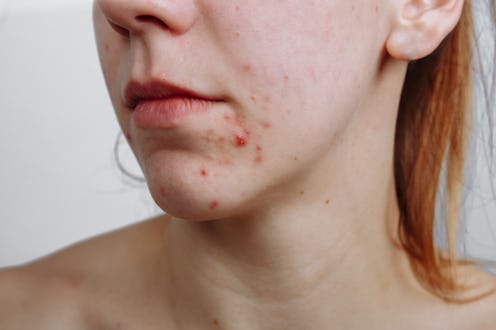Style
Your Phone Can Now Diagnose If You Have Acne & It's All Thanks To One Skincare Brand

Acne is one of the world's most common skin conditions. But whether it's just a few whiteheads or a breakout of deep painful cysts, its emotional impact can be devastating. French skincare brand La Roche-Posay's new Spotscan tool is aiming to democratise the acne-controlling process by making diagnosis and treatment a whole lot easier.
Spotscan is a free device that can identify how severe a breakout actually is and recommend a treatment plan to remedy it. All it requires is three photos of your face taken in decent lighting and without makeup on. (You can access the site on an Android or Apple device.) The artificial intelligence tool then uses an algorithm to compare your skin with dermatologist-reviewed images of more than 6,000 other people. At the end, you will receive a grade between zero and 4+.
The grade is based on the number of blackheads, pimples, and acne-related marks detected by Spotscan. If you are scored a three or above, you will be advised to visit a doctor or dermatologist. But users will also be offered a personalised skincare regime. Of course, it's not impartial as the only products it will recommend are from La Roche-Posay's Effaclar range, but it could be useful in finding a formula that works.
You can also track how your skin changes over the weeks and months, giving you deeper insight into what could be causing your acne breakouts and allowing you to see if your skincare products are making a positive difference.
In an interview with the Evening Standard, the brand's international senior product manager, Martin Foret, explained the importance of Spotscan. "Despite 40 percent of adults and up to 80 percent of teenagers being affected by acne, currently only 2 percent of the UK has access to a dermatologist," he said. "We built Spotscan to help these men and women with acne-prone skin understand the condition better and identify their recommended skincare routine."
Some experts are cautious of the technology. "I think that any tool that helps consumers gain confidence in managing breakouts is an asset," cosmetic dermatologist Dr. Sam Bunting told Harper's Bazaar. But she noted that some conditions like rosacea "have some features in common with acne" yet require different treatments. "So I think that there still needs to be a trained eye involved in diagnosis in many instances," she concluded.
Spotscan may be of benefit, however, to people with mild acne who cannot easily access face-to-face help. Those with moderate or severe acne should always visit a GP or skin specialist as they may need prescription medication, advises the NHS.
Unfortunately, no acne cure currently exists. But the condition can be kept under control. According to the British Association of Dermatologists, treatments fall under one of several branches. Topical options involve creams, gels, and ointments and may include ingredients such as benzoyl peroxide, azelaic acid, and nicotinamide. You may also be prescribed a course of antibiotics, an oral contraceptive, or a stronger acne-specific medication.
It's important to remember that no form of treatment is going to work wonders in a day and that results may only be visible a few months later. While inventions like La Roche-Posay's Spotscan may be an asset to some people's lives, others may need the eyes of a professional. At the very least, it may help you realise your spots aren't as severe as you'd feared.